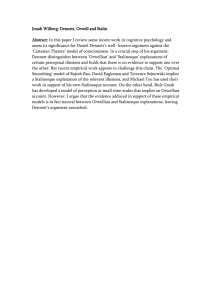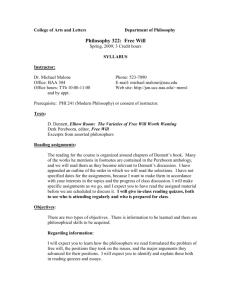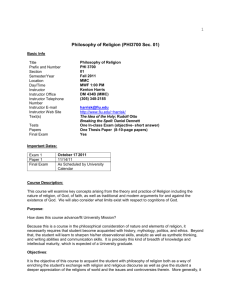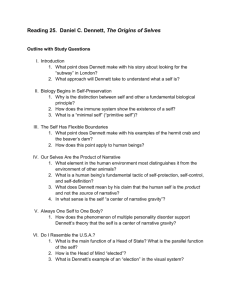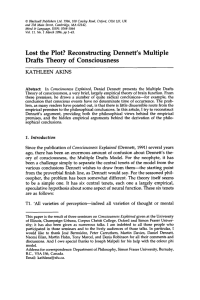Philosophy: April 15, 2014
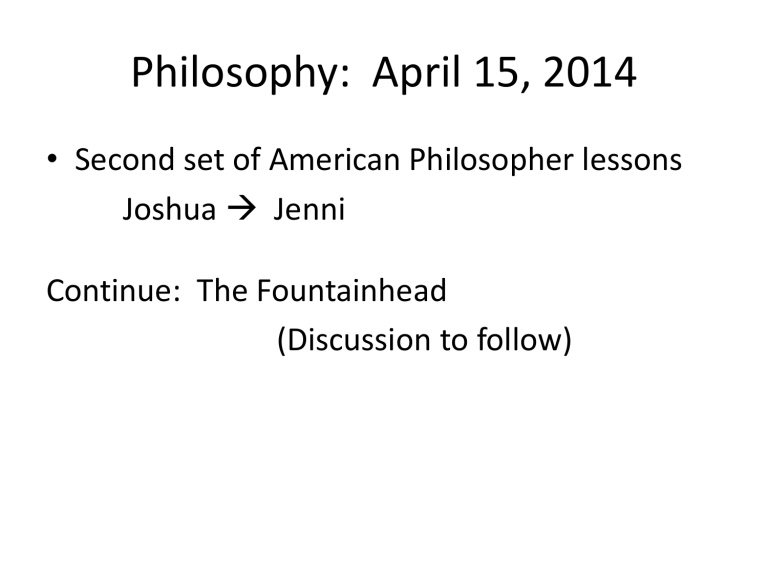
Philosophy: April 15, 2014
• Second set of American Philosopher lessons
Joshua Jenni
Continue: The Fountainhead
(Discussion to follow)
Schedule order for American
Philosopher lessons
• 1. Emma
• 2. Taylor & Gabby
• 3. Joshua
• 4. Hayden
• 5. Samuel
• 6. Kelly
• 7. Connor
• 8. Jenni
• 9. Mac & Dakotah
• 10. Brandon
• 11. Daniel & Johann
Daniel Dennett
Joshua Barchenger
Who is he?
Daniel Dennett was born on
March 28, 1942in Boston,
Massachusetts.
Dennett says that he was first introduced to the notion of philosophy while attending summer camp at age 11, when a camp counselor said to him, "You know what you are, Daniel?
You're a philosopher."
Who is he?
Daniel Dennett is an American philosopher, writer, and cognitive science whose research centers on the philosophy of mind, philosophy of science, and philosophy of biology (particularly evolutionary biology and cognitive science)
He is currently the Co-director of the Centerfor Cognitive Studies, the Austin B. Fletcher Professor of Philosophy, and a University
Professor at Tufts University.
Who is he?
He, along with Richard Dawkins, Sam Harris, and the late Christopher
Hitchens, is considered one of the Four Horsemen of New Atheism
Since Dennett is an atheist he has many different types of philosophies.
Where philosophers would assume an external force of some kind,
Dennett finds an explanation of the same things with internal reasons. Dennett tries to combine philosophy and science where possible, following the principle that philosophy is to guide science, not replace it.
His philosophies on free will
Dennett has developed a two-stage model for decision making, a key point of free will, that is in contrast to the religious and libertarian views.
In his book Brainstorms he states,
“when we are faced with an important decision, a consideration-generator whose output is to some degree undetermined produces a series of considerations, some of which may of course be immediately rejected as irrelevant by the agent
(consciously or unconsciously). Those considerations that are selected by the agent as having a more than negligible bearing on the decision then figure in a reasoning process, and if the agent is in the main reasonable, those considerations ultimately serve as predictors and explicators of the agent's final decision”
How Dennett defends this philosophy
Many libertarians attack this view as it defends the existence of free will. Dennett defends this philosophy with the following points:
1. First ... The intelligent selection, rejection, and weighing of the considerations that do occur to the subject is a matter of intelligence making the difference.
2. Second, he thinks it installs indeterminism in the right place for the libertarian, if there is a right place at all.
3. Third ... from the point of view of biological engineering, it is just more efficient and in the end more rational that decision making should occur in this way.
4. A fourth observation in favor of the model is that it permits moral education to make a difference, without making all of the difference.
5. Fifth—and he thinks this is perhaps the most important thing to be said in favor of this model—it provides some account of our important intuition that we are the authors of our moral decisions.
6. Finally, the model he proposes points to the multiplicity of decisions that encircle our moral decisions and suggests that in many cases our ultimate decision as to which way to act is less important phenomenologically as a contributor to our sense of free will than the prior decisions affecting our deliberation process itself: the decision, for instance, not to consider any further, to terminate deliberation; or the decision to ignore certain lines of inquiry.
Dennett’s Philosophy of Mind
Dennett suggests that consciousness is not located in a central part of the brain, that there are various events of content-fixation occurring in various places at various times in the brain. That the brain consists of a bundle of semi-independent agencies, when content-fixation takes placein one of these, its effects may propagate so that it leads to the utterance of one of the sentences that make up the story in which the central character is one's "self".
Dennett’s view on consciousness is that it is the apparently serial account for the brain’s underlying parallelism.
Dennett’s Philosophy of Mind
Dennett argues that consciousness is not a fundamental feature of the universe and instead will eventually be fully explained by natural phenomena. Instead of involving the nonphysical, he says, consciousness merely plays tricks on people so that it appears nonphysical—in other words, it simply seems like it requires nonphysical features to account for its powers. In this way, Dennett compares consciousness to stage magic and its capability to create extraordinary illusions out of ordinary things.
What does he say in his own words?
What is he saying? Simplified.
Our consciousness is not all that we make it out to be. It plays tricks on us, like magic shows, to make it seem like it is more than it actually is.
He also says that if you hold onto consciousness as being more than it is that you will not see evidence that points to it being a lot of tricks in the brain.
He points out that free will is not everything that we want it to be. He says that our free will is a result of evolutionary biology. Free will is gained with a greater competence, and competence evolved with time. The reason that free will exists is both competence and the ability to reason. The ability to reason also allows us to act, not only based on rational reasons, but the reasons that we present to ourselves. This is what free will is.
Alice Ambrose
Jenni Mann
Background
• born in 1906 Lexington, IL
• died in 2001
•
Orphaned at 13
• studied at Millikin University, University of
Wisconsin-Madison, and Cambridge
University
Education
• studied philosophy and mathematics at
Millikin
• earned her phd in Wisconsin
• earned her second phd and studied E. G.
Moore and Ludwig Wittgenstein at
Cambridge
Ludwig Wittgenstein
•
His philosophy and a lecture at Cambridge
• https://www.youtube.com/watch?v=r0cN_ bpLrxk
• https://www.youtube.com/watch?v=8LgLl9 oijZ0
Career
● worked with logic and mathematical philosophy
● worked as a professor
● wrote a textbook
● and other books
Her Books...
were collaborated with her husband and include...
•
Fundamentals of symbolic logic
• logic: the theory of formal inference
• philosophical theories
• essays in the unknown Wittgenstein
